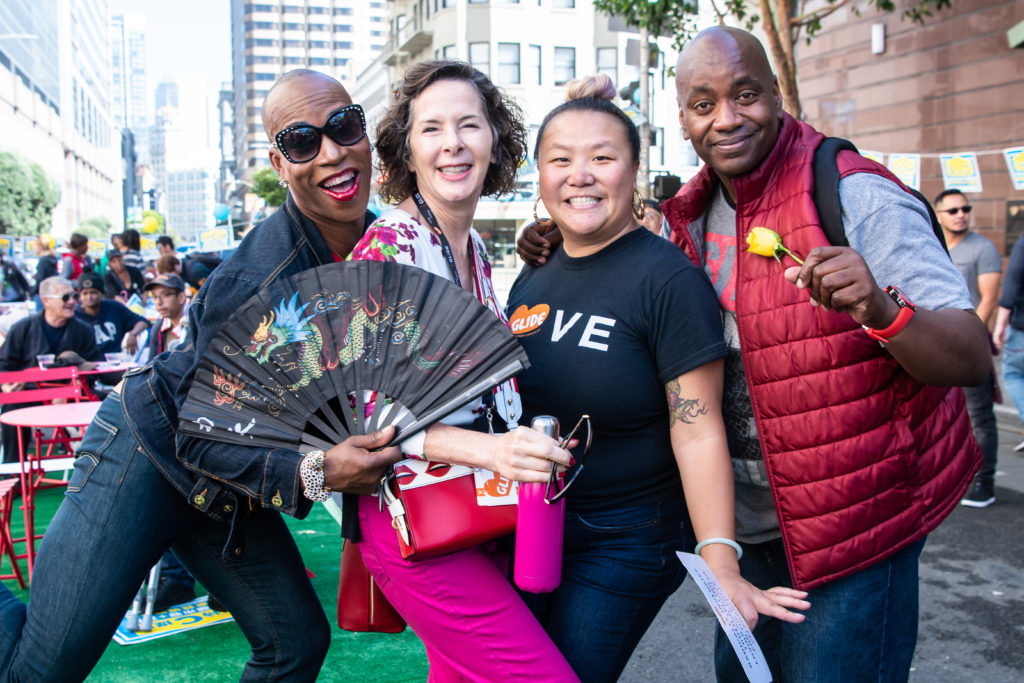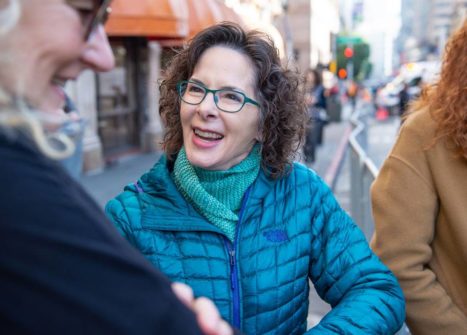Crickette Brown Glad shares her truth and experience with GLIDE’s harm reduction outreach
GLIDE Church has a long-standing tradition of featuring voices from the community in a segment of Sunday Celebration called “I Am GLIDE.” Personal testimonies on the strength and power of unconditional love from our program participants, congregants, donors and volunteers provide what we often refer to as “the GLIDE sacred text.” We feature these inspiring stories here when we can.
My husband passed away five years ago after 29 years of incredible marriage. I’m so grateful it lasted that long. We adopted three kids. But, even though the marriage was good, we couldn’t oversee all corners of our our children’s lives. Naturally, they got in trouble. My oldest…
When he was 15, he discovered alcohol, and probably pot. He tried black-tar heroin during college. Over the next five years, his life dissolved.
The point I’d really like to make is that when we talk about harm reduction, some people think of it as “enabling.” But we’re really not enabling; we’re hoping that we can keep people alive until they make that decision to stop. Because you can’t make that decision for them.
He was living on the streets in San Francisco because we couldn’t have him in our house anymore. He was being fed by GLIDE, and he learned how to inject heroin. About twice a week he told me that harm reduction teams would come out in the community and give them clean needles and supplies. And I am sure that that kept him alive because he never got HIV, he never got Hep C, he never got any of those nasty infections that we so often see.

GLIDE Church congregants Stacy Pearson, Crickette Brown Glad, Eden Chan and Darryl Kelly.
At some point he came to us and told us, “I can’t quit. Every day I tell myself I need to quit. But I can’t quit on my own. Can you help me?” So, we sent him to a program in Minnesota in the winter, and as soon as he got there he called and said, “This is the worst Christmas of my life.” And I said, “Oh no. This is the best Christmas of my life, because you’re safe, you’re getting clean, and you’re alive.”
Well, he spent a year there. It took him a full year to recover. And he’s been sober eight years now, and after all that time in rehab, it is now like talking to Buddha! He’s so wise and in touch with himself. Every time I have a relationship problem I call him up, and he always asks, “What are you afraid of?”
“I’m not afraid, I’m mad!”
“Oh no, Mom. The first emotion you had was fear.”
And I think, “Damn, he’s right.”
Yesterday was his 31st birthday, which we were so happy to celebrate. The point I’d really like to make is that when we talk about harm reduction, some people think of it as “enabling.” But we’re really not enabling; we’re hoping that we can keep people alive until they make that decision to stop. Because you can’t make that decision for them. God help us, we tried. Five times we tried. And he was never ready. But as soon as that person is ready, if they are still alive, they are going to get help.
We offer that help here in the building, in addition to the harm reduction that we do out in the community. Every Monday and Tuesday evenings and Friday afternoon we take a team out into the community to the hottest spots—and we know them all—and we pass out clean supplies to try to keep them alive until they decide that this is it, that they’ve had enough.
I tell you, every time I go out on Tuesday night, I see at least five or six people shooting up, and it’s so powerful: I see my son every time. I’m so grateful he’s alive, and I pray that each of these people can come to that place in their mind. But in order to do that, we have to keep them alive, and they need clean stuff to use.

I hope you understand that when we’re talking about addiction, we’re not talking about “them over there,” or “those people”; we’re talking about our family. Our own family. My son has the addiction gene and didn’t ask for it. It took him a long time to stop craving heroin. But it is possible, and we need to keep helping people stuck in the cycle of addiction.
When I’m out with the harm reduction team, I can’t tell you how many times we get the questions, “Where can I get rehab? Where can I find a place to sleep? Where can I get this and that?” And we’re there to help. I think if we weren’t there, we would lose a lot more people. Next Tuesday, I’m going to get trained on Narcan so I can save lives, which is so exciting.
Crickette Brown Glad is a GLIDE Board Member, volunteer and donor. She is the mother of three, and has been an active congregant with GLIDE Church for nine years. She spoke at Sunday Celebration on January 13, 2019.
